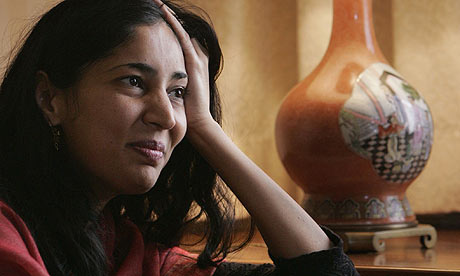
When Kiran Desai's Inheritance Of Loss won the 2006 Booker Prize, a few eyebrows were raised. Although she had a famous mother (Anita Desai) who had herself been on the Booker shortlist three times, Kiran was relatively unknown. Comparatively few had read her book, and the bookies had her down at fifth or sixth favourite. So far so normal – Hilary Mantel's victory this year is the first time I can remember a favourite winning. What was unusual that following on from its success the book was subject to protests and book-burning.
Sadly, it wasn't fans of fellow shortlisted author Edward St Aubyn's Mothers' Milk stoking the bonfires, but the outraged residents of Kalimpong. The novel tells of a 1980s rebellion of the ethnic Nepalese in the Himalayan town, who were fed up (in Desai's words) of being "treated like the minority in the place where they were the majority". As the book details, the rebellion was bloody and chaotic. Its fictional portrayal must have hit a raw nerve, especially since Desai herself was, as one man put it at the time, "an outsider" who made the "whole town … strange." She particularly seems to have offended those of Nepalese descent who thought themselves described as little better than thieves and menial fools.
There's perhaps a small grain of truth to these claims. Desai certainly doesn't glorify Kalimpong's non-Indian majority. But the irony is that they get off lightly compared to everyone else. As she teases out her multiple narrative we meet over-privileged Indians who put on absurd English airs; racist, ignorant and distinctly under-intelligent English people; Indians in America who use Gandhi's image to make money while exploiting other Indians; and Indians in America who allow themselves to be exploited. Also, there are the Americans themselves, whose capitalist empire is perhaps the cruellest thing in the book. Nearly every character she focuses on is at some stage degraded and humiliated. Nearly every character also degrades and humiliates others. The "loss" of the title is physical, spiritual, and inescapable.
It is in short a singularly acerbic novel. One that does not win friends by flattery. Even so, it's possible to see why the 2006 judges were won over. Desai's anger, for a start, is a force to be reckoned with. The cold, controlled rage with which she describes – say – an Indian in England watching a countryman take a beating and turn and flee, makes for occasionally heart-stopping reading. The indignation that builds over the course of the book, meanwhile, is overwhelming.
But there are also gentler pleasures. As much as anything this is a descriptive tour de force. There are fine evocations of the clean beauty of the Himalayas, the all-pervading dank of the monsoon, huge crumbling colonial mansions, crammed basements where bed shortages force immigrant labourers to sleep in shifts. Her prose is strong and vivid and generally a delight to read.
I say generally because occasionally Desai steps over the boundary between enjoyably rich and horribly cloying. Take the following, for instance: "a simple blind sea creature, but refusing to be refused … odd: insistent, but cowardly; pleading but pompous." That is how Desai renders a male "organ". There's also a whiff of sixth-form straining for profundity. A man who is blinded disappears "entirely inside the alcohol that has always given him solace". And when a light blows it diminishes "to a filament, tender as Edison's first miracle held between delicate pincers of wire in the glass globe of the bulb".
I also failed to engage with the book's main narratives. The politics and history are fascinating, but I felt dragged along the path Desai weaves through them. I had little sense of urgency or involvement. The central strand relating to the failed love between a privileged Indian girl and her Gorkha tutor, though refreshingly bitter rather than sweet, I found particularly flat. The female half of the equation (Sai) is the one character that Desai allows to escape with any dignity and the only one for whom she pushes any claim for respect and sympathy (rather than pity). Yet she too remained for me unreal, unformed, mildly annoying and largely uninteresting. I didn't care for her travails or anything else. So it was a book I admired rather than liked.
Yet I'm more aware than ever that these are subjective judgements. My basic objection is little more than that the book isn't to my personal taste. But is it to yours? And what else am I missing that the Booker judges saw. All comments will be even more gratefully received than usual, since they'll help inform John Mullan's final column of the month on readers' responses to the book.

